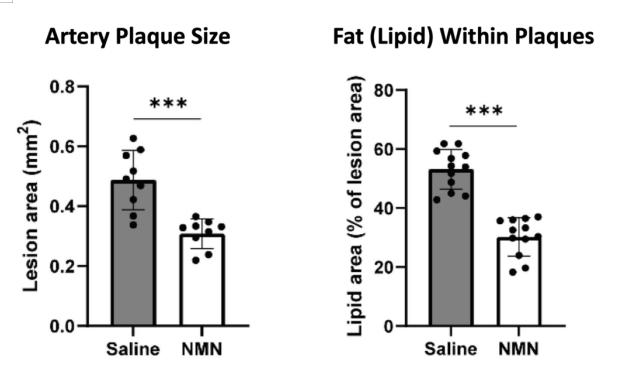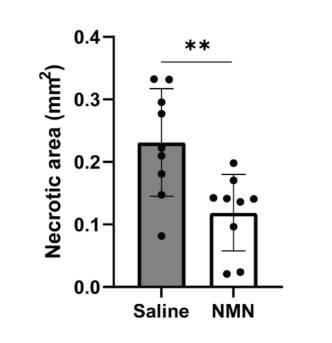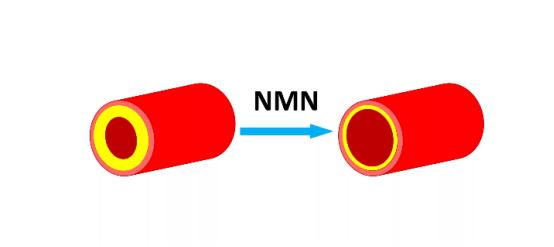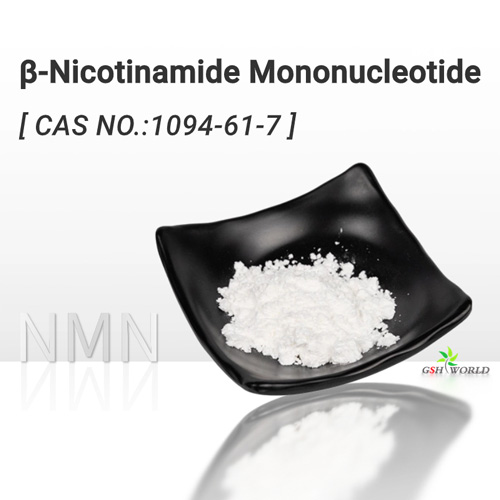In a mouse model of atherosclerosis, NMN prevents plaque buildup in the arteries and prevents plaque rupture, the most deadly age-related disease.
The researchers found that Nicotinamide Mononucleotide not only hindered atherogenesis (the formation of plaque in the arteries),
but also prevented plaque rupture associated with atherosclerosis.
This finding, found in mice, has important implications for how NMN supplements may mitigate the onset of atherosclerosis in humans.
Surprisingly, the origin of atherosclerosis remains unclear. This is despite the fact that atherosclerosis causes more than 300 million cases of cardiovascular disease worldwide.
In addition, cardiovascular disease remains the number one cause of death worldwide,
with 15 million deaths related to atherosclerosis in 2019.
What we do know is that the formation of atherosclerotic plaques is involved in inflammation and oxidative stress – Nicotinamide Mononucleotide has previously been shown to alleviate markers of aging.
To this end, researchers at China Agricultural University tested whether supplementing with NMN could stop or prevent atherosclerosis.
“This study suggests that NMN may play an anti-atherosclerotic role by reducing inflammation and oxidative stress, providing a potential therapeutic strategy for atherosclerosis,” the researchers said. They recently published a paper in the Journal of Functional Foods entitled “Niacinamide mononucleotides prevent atherosclerosis induced by a high-fat diet in mice and inhibit aortic inflammation and oxidative stress.”
Previous studies have also shown that Nicotinamide Mononucleotide has the potential to alleviate some aspects of cardiovascular aging.
For example, high blood pressure and arteriosclerosis (a key factor in atherosclerosis) have been shown to decrease after NMN supplementation in higher weight individuals.
In addition, in mouse models, Nicotinamide Mononucleotide can effectively improve heart function and prevent blood flow and oxygen supply limitations caused by atherosclerosis. These co-findings suggest that Nicotinamide Mononucleotide holds great promise in the fight against cardiovascular disease, especially in higher weight people.
The first study to test NMN in an animal model of prevalent atherosclerosis
The current study is the first to test NMN in an animal model in which atherosclerosis occurs.
One proven way to generate such models is through genetic mutations that cause blood cholesterol levels to rise.
Feeding mice a high-cholesterol and high-fat diet (HFD) for just 10 weeks inevitably reproduces the build-up of plaque in the arteries (atherosclerosis) seen in humans.
To test the effect of Nicotinamide Mononucleotide on atherosclerotic model mice,
the China Agricultural University researchers injected 500 mg/kg/day of NMN into their abdominal cavity for eight weeks (six days per week).
As a result, artery plaque formation was reduced by a staggering 38 percent compared to mice injected with saline (salt and water) alone. In addition, fat deposits within the plaques were significantly reduced by 43 percent.
The researchers said: “Based on these results, the data suggest that NMN can effectively inhibit atherosclerosis.

NMN helps unclog the arteries. Atherosclerotic mice treated with Nicotinamide Mononucleotide had lower arterial plaque size (lesion area, left) and fat within the plaque (lipid area, right) compared to mice treated with saline.
When arterial plaques are unstable, they can rupture, triggering a heart attack, stroke or sudden death.
A common feature of arterial plaque is the necrotic core, which is an area composed mainly of fat and dead cell debris that ruptures due to the process of necrotic cell death.
Unstable plaques that rupture easily contain particularly large necrotic cores. So to determine whether Nicotinamide Mononucleotide could prevent plaque rupture, the researchers measured the size of the dead core.
They found that NMN reduced the size of dead cores in the atherosclerotic mice, suggesting that Nicotinamide Mononucleotide could prevent arterial plaque rupture.

NMN prevents plaque rupture. Atherosclerotic mice treated with NMN had smaller necrotic core sizes (areas of necrosis) compared to mice treated with saline,
which, if large enough, could cause arterial plaque to rupture.
This study from China Agricultural University provides compelling evidence that Nicotinamide Mononucleotide,
a precursor to NAD+, may play an important role in fighting atherosclerosis.
Mechanistically, NAD+ is essential for energy metabolism and maintenance of mitochondrial health,
providing a possible explanation for the protective effect of NMN on atherosclerotic progression, including the risk of arterial plaque rupture.
Document source
- Wang, Z., Zhou, S., Hao, Y., Xu, T., An, P., Luo, Y., & Luo, J. (2024). Nicotinamide mononucleotide protects against high-fat-diet-induced atherosclerosis in mice and dampens aortic inflammation and oxidative stress. Journal of Functional Foods, 112, 105985.
- Puylaert, P., Zurek, M., Rayner, K. J., De Meyer, G. R. Y., & Martinet, W. (2022). Regulated Necrosis in Atherosclerosis. Arterioscler


